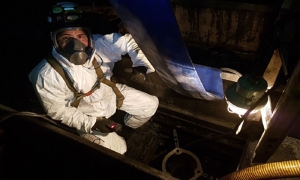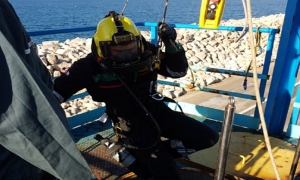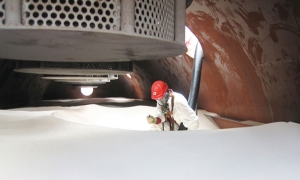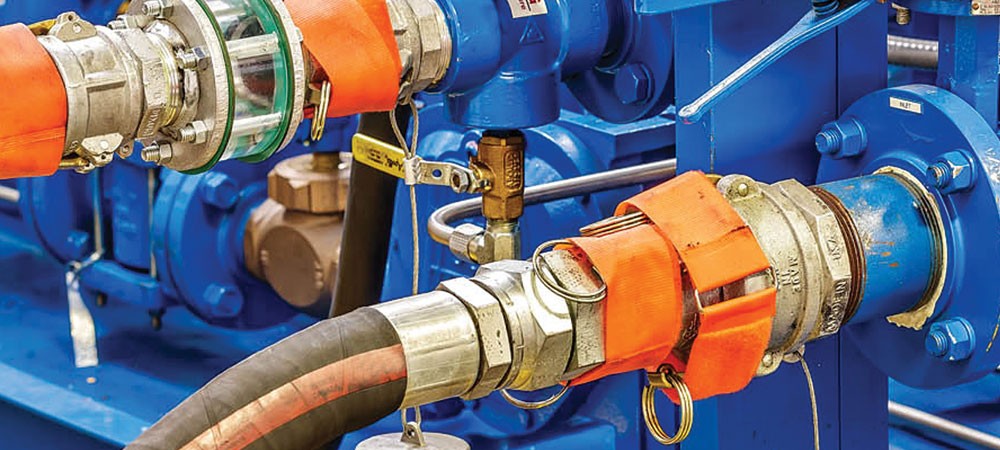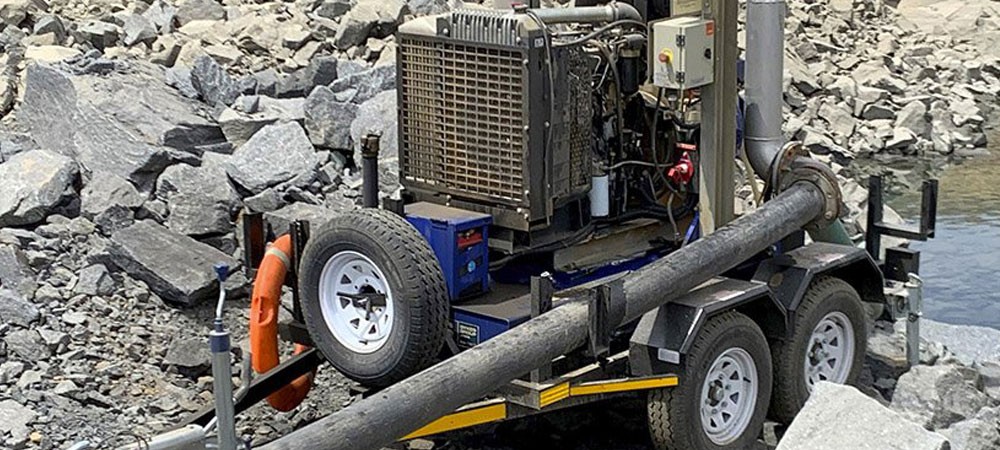Catalyst Handling
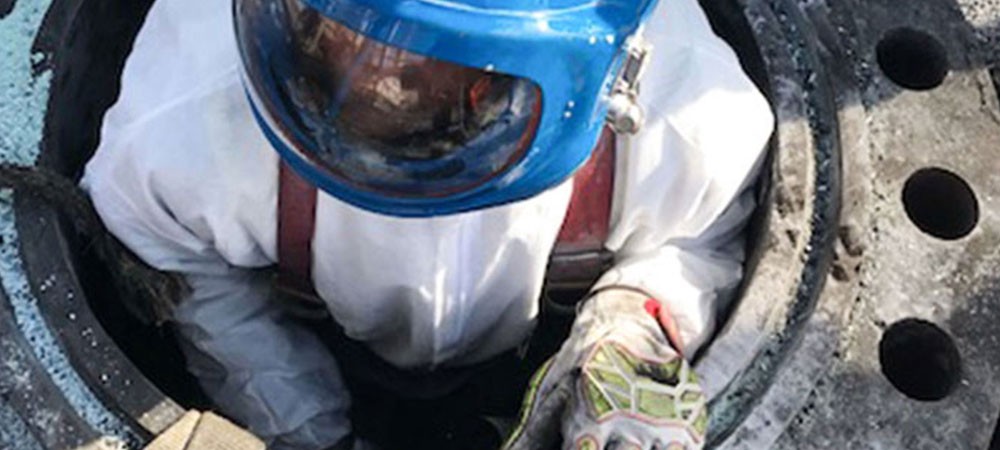
Catalyst Handling
By utilizing a specially trained workforce and purpose-built equipment, Contract Resources can execute catalyst projects efficiently and safely, with minimal delays from fusing, minimal catalyst attrition, and excellent dust control systems.
- Pre-commissioning of reactors and vessels
- Services in inert and toxic atmospheres, plus hot and hostile environments
- Reactor cooling utilizing a proprietary liquid Nitrogen system
- Unloading and loading of catalysts under inert or normal atmospheres
- Dense Phase Loading systems for the transfer of catalyst directly from grade to reactor manway, without the use of Cranes and Hoppers.
- Innovative, purpose-built equipment ensures a low catalyst attrition rate
- Catalyst sampling and particle measurement
- Vacuum unloading with closed-loop nitrogen re-circulation
- Catalyst transportation, storage, and containment (UN-approved)
- Catalyst loading of reactors using dense loading and conventional techniques
- Tubular Reformer loadings usingUndines and conventional techniques
- Pre-sulfating (DMDS Injection)
- Metals reclamation and disposal of materials
- Video inspection and assessment
- Shutdown planning, coordination, and execution
CATALYST HANDLING SERVICES
Catalyst handling services are a specialized type of service within the petrochemical industry. Around the world, there are just a few catalyst-handling resources and catalyst-handling procedures. These companies need to have sufficient expertise and extended experience that complies with the high standard to execute the catalyst handling project in a professional way. With our dedication and expertise, we are focused on safety, quality, progress, costs, and most important customer satisfaction. We offer our services as a complete package to unburden our customers with their catalyst handling jobs and implement the newest innovations.
The catalyst handling procedure is very important, during this period of catalyst handling the risks to health, safety and the environment are very high, no mistakes are permitted, an error can result in the death of a catalyst technician, uncontrolled self-heating of the catalyst or environmental contamination, when this happens it directly results in more downtime. We offer a catalyst unloading robot method, and our catalyst loading and unloading procedure will reduce the risks. Fill in our contact form so we can get in touch, to understand your specific situation and offer you the best solution.
Catalyst handling services are a specialized type of service within the petrochemical industry. Around the world, there are just a few catalyst-handling companies with sufficient catalyst-handling resources and catalyst-handling procedures.
Catalyst unloading can be done in various methods and systems. Our catalyst unloading system is different from other companies and is designed to reduce the possible contact with hazardous products, inert entry hard labor dislodging fused catalysts.
Catalyst handling is in general underestimated. It is an important part of the catalyst changeout. During the process inside the reactor, there are happening a lot of things such as preferred process flow, hot spots, build-up cokes, and unexpected contamination from de-feed that has an impact on the lifetime of the catalyst. With the presence of an experienced catalyst consultant with adequate field experience, none of its information will be lost. Already at the start of the project preparation, this expertise will help to make a reactor catalyst unloading procedure to make sure that no information will be lost at the beginning of the catalyst changeout.
CATALYST HANDLING SERVICES
The economic environment of the refining industry is, by nature, very competitive. As a result, refiners have always paid a lot of attention to the performance of their process units, the challenge of the energy transition making this objective even more critical.
Most process units are using costly sophisticated catalysts aimed at improving performance. However, selecting the best catalysts may be meaningless if they are not correctly used which, in the case of fixed bed reactors, implies a perfect and safe loading.
It is widely recognized that efficient catalyst loading significantly increases the process unit's performance by improving the flow distribution inside the reactor, here meaning the contact between solid (i.e., the catalyst), liquid, and gas. This also prevents any settling of the bed and results in more reliable operations.
Dense loading may allow either to increase the throughput of the unit by about 10% at a constant reactor inlet temperature or to achieve the same performance level at a lower operating temperature, allowing reduced fuel consumption.
EMBARK proposes an attractive option to the refiners by offering its patented HDL Process which provides dense loading of catalysts using the EMBARK Equipment.
Based on extensive proven know-how from highly qualified specialists, this technology allows for the reduction of the void volume within the catalyst pellets to its very minimum and gives a homogeneous fixed bed with a packed density increased by around 20% compared to conventional loading.
The EMBARK approach is also aimed at ensuring the maximum safety level. This is achieved thanks to dedicated training of operators allowing them to work inside reactors in complete safety (see box). Moreover, due to its lightweight (15 kgs), the EMBARK device can be easily and quickly installed, resulting in less time spent by the operator inside the reactor. And thanks to the use of soft brushes, the catalyst distribution system produces less dust, for the benefit of the operator's health.
EMBARK has realized dense loading in more than 1,700 reactors or adsorbers for a total cumulated amount of 150,000 metric tons of alumina or zeolite-based catalysts and molecular sieves.
Some catalysts must not be put in contact with oxygen or water to avoid ignition or loss of performance. So, they need to be handled under a nitrogen atmosphere.
During the loading or unloading of such catalysts, operators may have to enter the reactor and work under an inert atmosphere. Such operations are very critical to safety and require taking rigorous precautionary measures to avoid asphyxia.
Appropriate equipment, procedures, and training are required to ensure that breathable air is always provided to the worker and that he can escape safely should an unforeseen problem occur.
